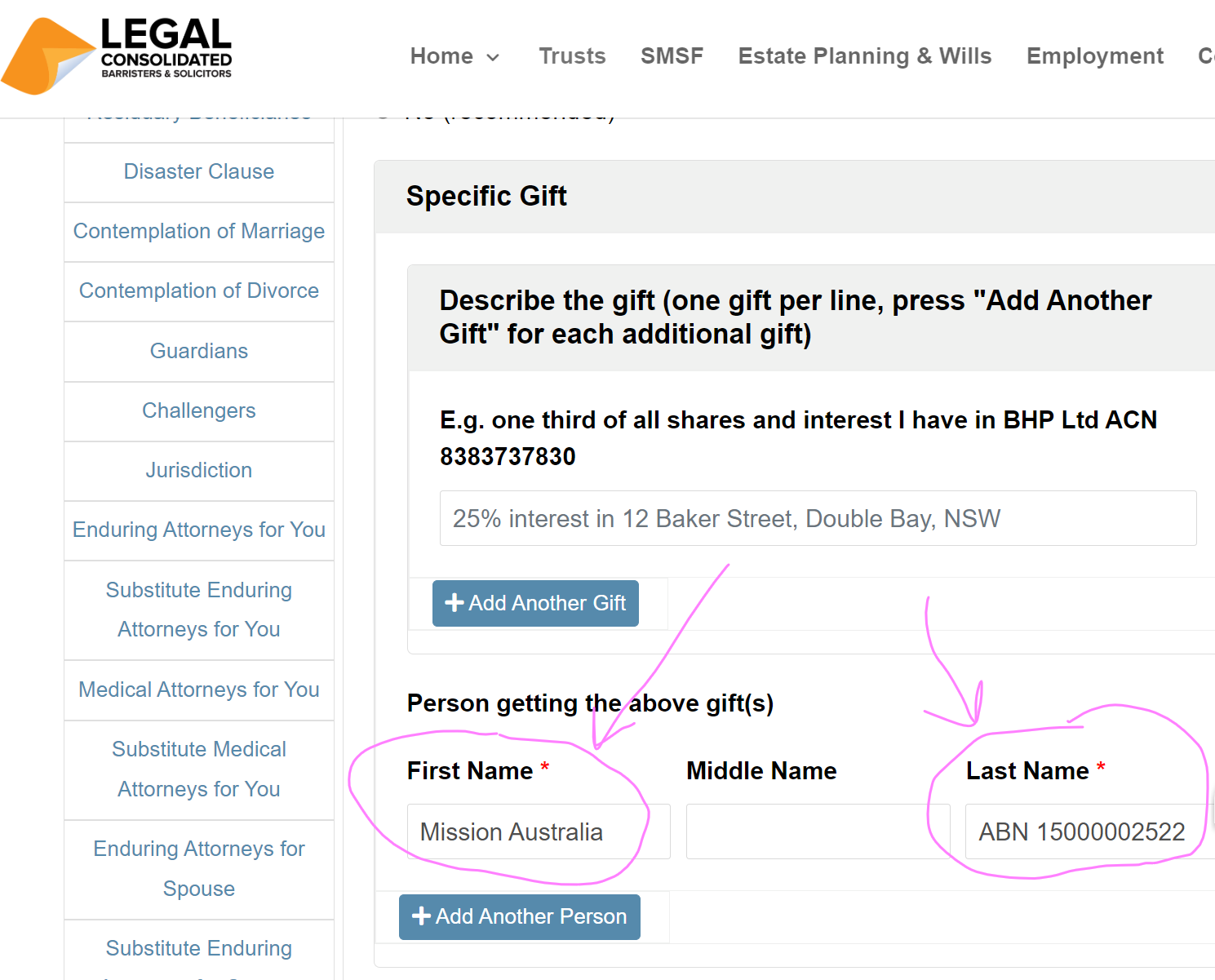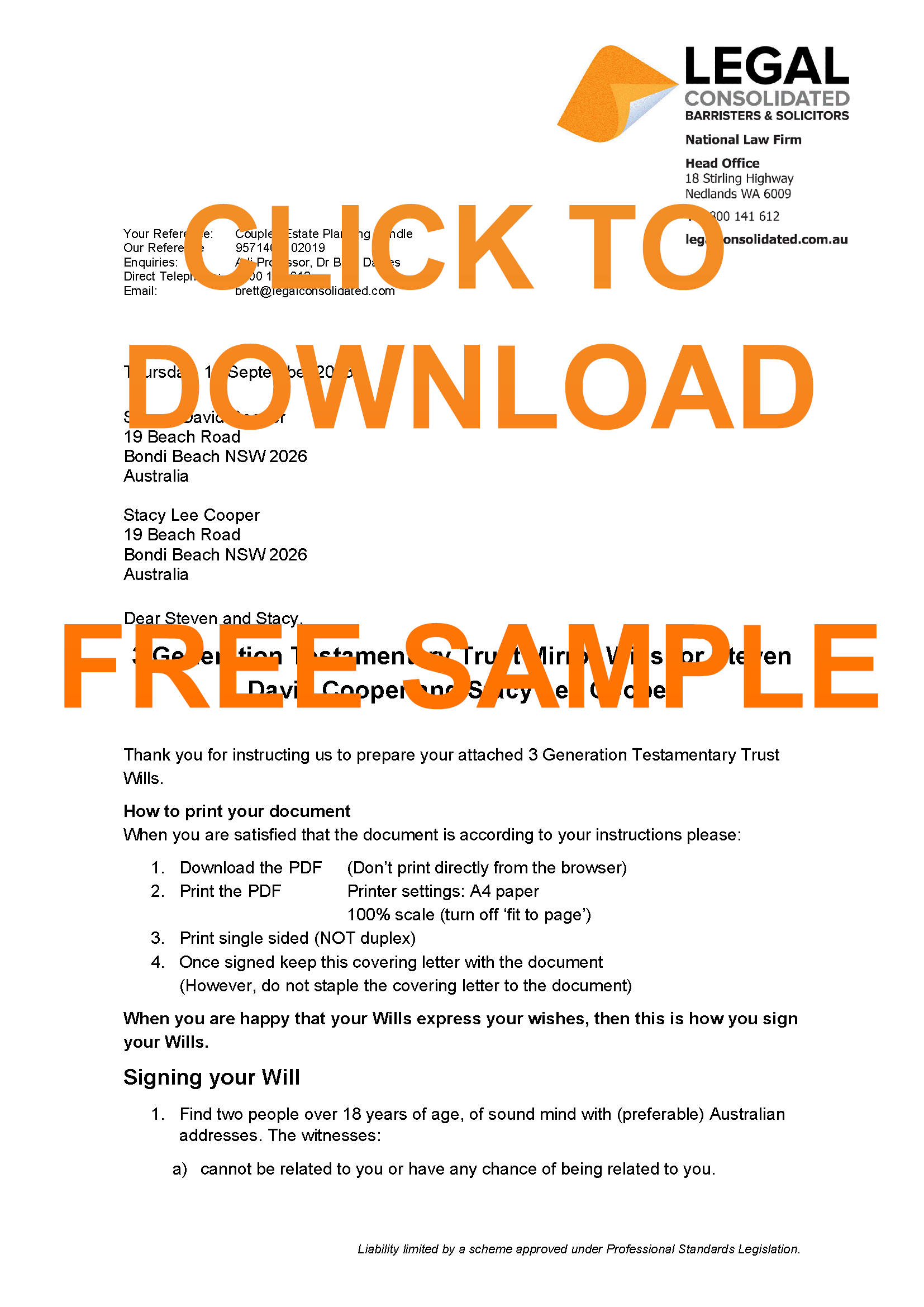
Lending money to mum and dad – Loan to Parent
How does a child lend money to a parent?
1. Sad child lends money to parents
Handing money to your mum and dad? You give your mum $600k.
This is to get her into quality aged care.
- Mum gets married: She then marries the young and handsome Ken. Later they divorce.
The Family Court gives the handsome Ken half of the $600k. It is the only asset of the marriage.
The Family Court is not interested that the money is a gift from you. Instead, build and get mum to sign this Loan to Parent Agreement. loan to parent
- Or mum dies. Your siblings say:
‘Thank you for giving mum $600k as a gift.
Mum’s Will states everything equally to us.
There is no Loan to Parent Agreement to say it was a loan. So it is a gift from you. Yippee, what a great windfall.’
2. Smart child lends money to parents
You lend mum $600k to move into quality aged care.
You build and get Mum to sign the parent Loan Agreement.
- Mum marries toy boy: Mum marries a fast talking gentleman in the retirement home. They then divorce. He wants half of her assets.
The toy boy states that her assets are $600k. He wants $300k. The Family Court is shown the legally prepared Loan Agreement. The Family Court orders that he gets nothing. This is because your mum’s net assets are nil.
- Mum dies. Your greedy siblings are pleased to see that Mum’s estate is $600k. This is solely from the sale of her aged care home. But mum’s estate has a $600k debt owing to you. You get your $600k back first.
To protect your parent loan build a legally prepared Parent Loan Agreement. This is on our law firm’s website. Homemade loan agreements may not work. They carry less weight with the Family Court and Bankruptcy Court. Why take the risk?
I love my mum! I don’t want to ‘lend’ money to my mum
There is nothing wrong with helping your parents financially. But protect the money in case:
- mum’s divorce from that toy boy in the nursing home
- your parents go bankrupt
- your dad suffers from drugs prescribed by his doctor
- your mum suffers a mental condition
- your parents stop loving you
- you run out of money yourself
- your parents leave everything in their Will to all their children equally – you end up giving money to your siblings
You can always forgive the debt, at a later time.
How to document a loan from a child to a parent
Never ‘give’ your parents money. Always ‘lend’ them money ‘payable on demand’. Get it back if something goes wrong.
With the Loan to Parent Agreement, you never rely on a verbal agreement. Build a Loan Agreement on our law firm website. We are Australia’s only law firm website, directly, providing legal documents online. It puts everything in writing with rules for the loan.
Any tax issues when a child lends money to mum and dad?
We do not provide tax or other advice on the Loan Agreement. We also do not know your individual circumstances. Speak with your accountant and financial planner.
Can I lend mum and dad for their superannuation?
You can lend money to your parents for any purpose. But speak with your accountant and financial planner regarding the wonderful tax haven called Superannuation and whether your parents should or can contribute.
Also, unless your parents have a Superannuation Testamentary Trust in their Wills, super at death going to adult children suffers up to 32% tax.
When a child lends money to a parent:
1. talk with all your parents and your siblings together about the loans
2. never gift parents money – only loan them money (this protects both you and them)
3. do not rely on home-made loans or IOUs – build a Legal Consolidated Loan Contract
/is-it-legal-to-build-your-parents-wills/
Child to Parent Loan Agreement on the back of an envelope?
In the movies, IOUs are often handwritten on a piece of paper. Sometimes instead of a Child to a Parent Loan Agreement, someone does a ‘minute’. Both approaches fail. In Rowntree v FCT [2018] FCA 182 shows the additional care required to document even simple related-party transactions, such as loans. In this case, the taxpayer, a practising NSW lawyer, claimed he borrowed over $4m from his group of private companies. The Court said:
‘Mr Rowntree has not deliberately chosen to ignore the law. His evidence presented to the Tribunal suggests that he genuinely believed that there were arguments to support his view that a loan was in existence.’
He failed. Only a legally prepared Loan Agreement satisfies the ATO, Bankruptcy Courts and Family Court.
See free sample of a Child to Parent Loan Agreement
Press ‘Start Building for free‘ button above to build:
- Our law firm’s letter of advice.
- Loan to Parent Agreement – ready to sign
Press the above “Sample” button to see full free sample. This includes our law firm’s covering letter.
Can I use the Loan Agreement to put a caveat over my parents home?
Q: I am a financial planner who specialises in aged care advice. I am often asked: do I need to sell my home to pay the aged care bond and nursing home costs?
As the population of Australia ages, more mums and dads can no longer look after themselves at home. They need to enter residential aged care.
Usually there is a lump sum payment required. This is for admission to an aged care facility. It is called an a Refundable Accommodation Deposit (RAD). This bond ranges from $200,000 on up. The bond amount is based on:
- Mum and dads ‘assets’.
- Demand for rooms where the aged care facility is based.
- The skill of the financial planner and accountant to negotiate the price.
- The extra services the aged care facility offers.
An average Australian family, of retirement age, has almost 60% of their assets tied up in their family home. Often the sale of the family home is required to fund the aged care buy in.
Can a child lend mum and dad the money? This is by building a Legal Consolidated Loan to Parent Agreement? This is so when mum and dad die the child gets back the money the child lent the parents? This is before the wealth in the Will is paid out?
A: We do not give advice on what the parents will use the money for. We do not give advice on funding for aged care.
But, generally, yes, you can. The Legal Consolidated Loan to Parents Agreement is structured to achieve that outcome.
The Legal Consolidated Loan to Parents Agreement is unsecured. But there is power in the Loan Agreement to register caveats, mortgages etc… over your parent’s assets. But until you do so, the loan by the child to the parents is unsecured.
While unsecured it means that if mum and dad go bankrupt the child stand in line with all the other unsecured creditors.
Resources to empower you to comply with Centrelink
Free Centrelink tool kit:
-
Estate Planning:
- Centrelink compliant Power of Attorney – keeps your family in control, not Centrelink
- 3-Generation Testamentary Trust Wills – beneficiaries retain Centrelink benefits in your Will
- Special Disability Trust – in your spouse’s Will to avoid Centrelink deprivation rules
- Abandon a gift in a Will to keep the pension?
-
Family Trusts:
- Replacing the Appointor in a Family Trust – succession planning for a person wanting Centrelink
- Company to replace pensioner as trustee of a Family Trust
- Wind up and get rid of the Family Trust – Centrelink compliant
- Can beneficiaries disclaim a Family Trust distribution?
-
Self-Managed Super Fund:
- Removing a pensioner as a member of a SMSF
- Keep super in the fund when your spouse dies – escape means testing
- Get rid of unused Self-Managed Super Funds Deeds
- Wind up Unit Trusts
- What to do before the end of year financial year – to appease Centrelink
Mum and Dad want to keep home but still move into aged care
Q: Dad (on his own) needs to go into aged care. Mum is dead.
A: Legal Consolidated is a law firm. We are not financial planners. We are not accountants. And we do not work in Aged Care and bonds. So we cannot comment on those strategies.
- The forms for the Mortgage and Caveat can generally be downloaded for free from the local titles office.
- The PPSR form is online. This is not for land. Instead, it is for chattels such as a car, truck and caravan.
Free Asset Protection Kit for clients of lawyers, financial planners and accountants
Clients often start their asset protection journey by speaking with their accountant, financial planner or lawyer. Legal Consolidated has put this kit together to help these professionals on what needs to be done. Enjoy the free resources:- Asset Protection Strategies – a complete list and how to use them.
- Family Trusts – how to set up a safe house vehicle (free training video).
- Loans to children – in case the child divorces or goes bankrupt.
- Loans to parents – a rich child lends money to parents to get into a retirement home.
- Spouse Loan agreement – ‘safe house spouse’ lends to high-risk spouse (man of straw strategy)
- Forgiving a Debt – for ‘love and affection’.
- Deed of Gift:
- to a Family Trust – to prove the money you put into your Family Trust was a gift (not a loan)
- to a child – forgive the money your child owes you
- to a person overseas – forgive what the person owes you
- Stop mistresses and disgruntled children challenging your Will.
- Stop people stealing money from your disabled and vulnerable children when you die (free training video).
- How to set up a Bankruptcy Trust in your Will.
- The value of a Divorce Protection Trust in your Will.
Lend your parents the ongoing RAD instead
Q: Further to home retention and use of a capital loan from the children.
In many cases, lending to parents to pay their Refundable Accommodation Deposit ( RAD = the capital) is not a good idea. Why? It means that the parent has to pay additional aged care fees. This is because of means-testing. It is calculated at 1% pa for a portion and then up to 2% pa on the excess.
However, another way is for the children to instead pay the Daily Accommodation Payment:
DAP = ongoing expense similar in concept to rent, and currently calculated at about 4% pa
This way there may be no means-testing. Mum’s family home is still retained. The children keep their funds invested. And it minimises the amount lent.
A: We do not give advice on what is clearly financial planning and accounting work.
The Legal Consolidated Loan to Parents Agreement caters for lending more money from time to time. So it caters for the ongoing debt accumulated.
But again speak to the financial planner and accountant. We are merely providing a Loan Agreement.
Who is the Borrower?
The Borrower (a parent or a related party controlled by your parent) is the entity (human or company) who is going to receive the capital (e.g. money) from the lender (child or an entity you control).
Who is the Lender?
The Lender (Child) is the entity (human or company) who is passing the capital (e.g. money) to the Borrower.
In this Loan to Parent Agreement, the person who is the Lender is lending the money and the person who is the Borrower is the person borrowing the money.
What do I get?
Why is it better to prepare my Child to Parent Loan Agreement on a lawyer’s website?
You are dealing directly with a law firm’s website, therefore you:
- Retain legal professional privilege
- Legal Consolidated is responsible for the Child to Parent Loan Agreement
- Receive legal advice from us
- You are supported by our 100% money back guarantee on every document you build
How do I build the Loan to Parent agreement?
- Answer the questions on our website.
- Read the Summary page.
- Lock and Build your document.
- Type in your Credit Card details.
- The Child to Parent Loan Agreement, our covering letter and Tax Invoice are emailed to you.
- Print and sign the Child to Parent Loan Agreement.
In the Loan to Parent agreement, you get an email that contains:
Loan to Parent Agreement
Our law firm letter of advice on our law firm’s letterhead and signed by one of our Partners.
Sometimes you don’t know the amount that you are lending to your parents. If you don’t know you can leave it as the default answer; “as lent from time to time”. This gives you some wiggle room.
If you do know but are paying it in instalments, then put it all in as one figure.
Otherwise, just put in the total figure. Remember to put in the dollar sign.
Sometimes you might not want to set a specific date in the Child to Parent Loan Agreement. You can leave it as the default answer; “payable on demand as demanded by the Lender”. This also allows you to recover the debt when your mum and dad dies. To put it bluntly it overrides their Will.
If you want it all paid back on the one date, just enter that date in.
Word the Child Lending Money to Parent Loan Agreement how you like. For example
- “Payable in instalments of 10% per calendar month”.
- “Half to be paid on 21 September 2018, and the remainder to be paid on 21 September 2019”.
- “$100 to be repaid weekly for 10 weeks starting from 4 July 2018”
There are five ways you can answer this question depending on how you’d like to do it:
- If you are charging your parents no interest, put the word “Nil”.
- If you aren’t sure what the interest rate is yet for your mum and dad, leave it as the default, which is “as demanded from the lender from time to time”.
- You can put in a flat rate, for example, “5%” (don’t forget to put the % sign in).
- Keep it variable, for example, “2% above the Commonwealth Bank interest rate”.
- You can also use the inflation rate. You could word it something like “calculated according to the percentage increase in the Consumer Price Index (all groups) for the average of the capital cities of the Commonwealth of Australia (as published from time to time by the Australian Bureau of Statistics or body that takes over that function)”.
Protects from death duties, divorcing and bankrupt children and a 32% tax on super. Build online with free lifetime updates:
Couples Bundle
includes 3-Generation Testamentary Trust Wills and 4 POAs
Singles Bundle
includes 3-Generation Testamentary Trust Will and 2 POAs
Death Taxes
- Australia’s four death duties
- 32% tax on superannuation to children
- Selling a dead person’s home tax-free
- HECs debt at death
- CGT on dead wife’s wedding ring
- Extra tax on Charities
Vulnerable children and spend-thrifts
- Your Will includes:
- Divorce Protection Trust if children divorce
- Bankruptcy Trusts
- Special Disability Trust (free vulnerable children in Wills Training Video)

- Guardians for under 18-year-old children
- Considered person clause to stop Will challenges
Second Marriages & Challenging Will
- Contractual Will Agreement for second marriages
- Wills for blended families
- Do Marriages and Divorce revoke my Will?
- Can my lover challenge my Will?
- Make my Will fair: hotchpot clauses v Equalisation?
What if I:
- have assets or beneficiaries overseas?

- lack mental capacity to sign my Will?
- sign my Will in hospital or isolating?
- lose my Will or my home burns down?
- have addresses changed in my Will?
- have nicknames and alias names?
- want free storage of my Wills and POAs?
- put Specific Gifts in Wills
- build my parent’s Wills?
- leave money to my pets?
- want my adviser or accountant to build the Will for me?
Assets not in your Will
- Joint tenancy assets and the family home
- Loans to children, parents or company
- Gifts and forgiving a debt before you die
- Who controls my Company at death?
- Family Trusts:
- Changing control with Backup Appointors
- losing Centrelink and winding up Family Trust
- Does my Family Trust go in my Will?
Power of Attorney
 Money POAs: NSW, VIC, QLD, WA, SA, TAS, ACT & NT
Money POAs: NSW, VIC, QLD, WA, SA, TAS, ACT & NT
- be used to steal my money?
- act as trustee of my trust?
- change my Superannuation binding nomination?
- be witnessed by my financial planner witness?
- be signed if I lack mental capacity?
- Medical, Lifestyle, Guardianships, and Care Directives:
- Company POA when directors go missing, insane or die
After death
- Free Wish List to be kept with your Will
- Burial arrangements
- How to amend a Testamentary Trust after you die
- What happens to mortgages when I die?
- Family Court looks at dead Dad’s Will



